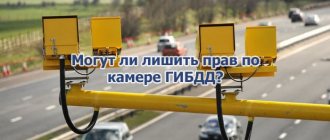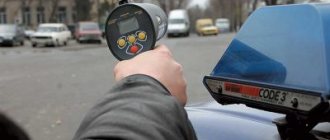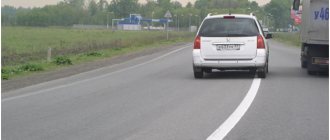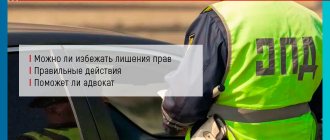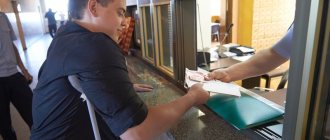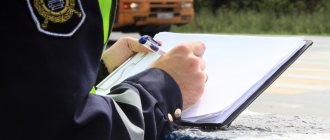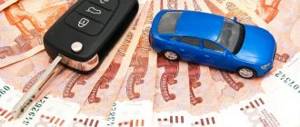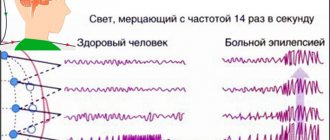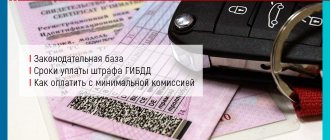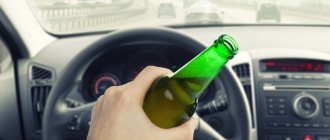Deprivation of a driver's license is one type of punishment for an administrative offense while driving a motor vehicle.
Dear readers! The article talks about typical ways to resolve legal issues, but each case is individual. If you want to find out how to solve your particular problem , contact a consultant:
+7 (499) 938-81-90 (Moscow)
+7 (812) 467-32-77 (Saint Petersburg)
8 (800) 301-79-36 (Regions)
APPLICATIONS AND CALLS ARE ACCEPTED 24/7 and 7 days a week.
It's fast and FREE !
A traffic police officer, having stopped a driver on the road, does not have the right to take away the driver’s license if he has one. Rights can only be deprived through the courts.
The relatively recent procedure for deprivation of driving privileges in absentia is applied to two cases - the person driving the car does not have a license, and the person who violated the license is not at the court hearing.
Let us consider in more detail the features of such a procedure as depriving a driver of his rights in absentia.
Can they deprive
The right to drive a category or several categories of motor vehicles can be revoked in absentia in two ways:
- When the person who was driving did not have a driver's license at all.
- When the person who violated the traffic rules (traffic rules) for some reason could not attend the trial.
In the first case, the driver will not be allowed to take driving tests or obtain a driver's license until he settles the case through the court - the issue of seizure of the right to drive a vehicle is resolved.
In order to lift the moratorium imposed on the driver, it is necessary to collect enough evidence that the driver driving the car without a driver’s license has undergone sufficient punishment under the law and has taken the path of training at a driving school.
In the second case, a decision is made on the violator to seize his existing driver’s license in his absence.
Here, either the notification of attendance at the court hearing came late - after the decision to deprive the rights was made. Or the notification never arrived.
Or the materials did not reach the court in the region where the driver lives and must appear in court for a hearing. That is why the driver did not know anything about the fact that he was deprived of the right to drive a car.
The standard procedure for revocation of driving privileges consists of the following steps:
- A traffic police officer draws up a protocol stating that a violation has been detected. Legislative framework – clause 1, part 2, art. 28.3 of the Code of Administrative Offenses of Russia or clause 109 of Order of the Ministry of Internal Affairs of the Russian Federation No. 185 dated March 2, 2009 with the latest amendments dated December 22, 2014, valid in 2020.
- The protocol, along with other collected papers, is sent by the traffic police inspector to the court for consideration. The basis of the law is Part 1 of Art. 28.8 Code of Administrative Offenses of the Russian Federation or – Part 1 of Art. 29.5 Code of Administrative Offenses of Russia.
- The administrative record is reviewed in the magistrate's court, where the judge makes his final verdict. Grounds for the law – Part 1 of Art. 29.9 Code of Administrative Offenses of the Russian Federation.
From all this, in light of the topic of absentee confiscation of a driver’s license, it follows that, according to the law, a traffic police inspector does not have the right to confiscate a driver’s license.
This is indicated in paragraph “a” of paragraph 50 of Art. 1 of federal legal act No. 196-FZ of July 23, 2013, also valid in 2021 with all innovations and amendments.
The traffic police inspector is obliged to transfer all materials to the magistrate’s court at the violator’s place of residence. Then the court will make a final decision when the driver’s license is revoked in absentia, if they do not have one, or if the driver cannot attend the court hearing.
Note! If the driver’s guilt has not yet been proven, then he is not obliged to prove his case; according to the law, he will be considered still innocent. This is indicated in parts 2-4 of Art. 1.5 and in part 1 of Art. 25.1 Code of Administrative Offenses of Russia.
But in order for the results of the case to be in favor of the driver, he must be present at the hearing of the case and bring maximum strong evidence of his innocence, or the punishment already incurred.
Failure to pay fines
Late payment of administrative fines is considered evasion of punishment. A more severe punishment is provided for this act, but it is not associated with the deprivation of driving privileges. So, according to clause 1, art. 20.25 For failure to pay fines, you can receive a fine twice as large as the previous one, which cannot be less than 1000 rubles.
In addition, for this they can be arrested for no more than 15 days or receive a decision to perform compulsory labor for a period of up to 50 hours.
Important! The payment period excluding deferments and installments is no more than 60 days.
At the same time, for evading serving an arrest or in case of unauthorized leaving the place where a person is supposed to serve an administrative arrest, you can be subjected to compulsory labor for 50 hours; evading compulsory work may entail receiving a fine in the amount of 150 - 300 thousand rubles or receiving arrest up to 15 days. This is the punishment faced by those who do not pay fines, but their rights are not taken away.
In which cases
A violator can be deprived of the right to drive a car in absentia only if the traffic police inspector draws up a protocol or a resolution stating that an administrative offense has been recorded.
But at this stage it is not yet considered that the driver has been deprived of his license; you must wait until the decision of the magistrate comes into force.
A driver's license will be revoked in absentia in the following cases:
- Driving without license plates, or using fictitious license plates (Part 2 of Article 12.2 of the Code of Administrative Offenses of Russia).
- Control of a vehicle on which additional light and sound equipment is installed, which civilians, but only civil servants or military personnel, have no right to use.
- Control of the car was transferred to someone who was drunk at the wheel.
- Exceeding the speed limit on a particular section of the road - more than 60 or 80 km/h.
- Illegal overtaking, driving in the oncoming lane.
- Violation of the “Brick” sign while illegally entering a one-way road.
- Causing grievous harm when committing an offense with consequences of an accident.
- When the driver ran away from the scene after an accident.
- Driving a car without a driver's license.
You can also deprive your license if the car was painted with the same symbols and logos as government cars belonging to the Ministry of Internal Affairs, the Ministry of Emergency Situations, ambulances and others.
This is especially true also in cases where all of the above offenses were detected by traffic police inspectors repeatedly against the same person.
Then, in addition to the deprivation of rights in absentia, they may also be forced to pay a double fine. The amounts are quite large.
And if you take into account legal assistance when appealing a court decision, then financial costs will increase even more.
How the driver is notified
Let us remind you once again that the certificate cannot be confiscated by the traffic police inspector; it is handed over by the owner of the document to the nearest state traffic police office, after a court hearing has been held and a decision has been made to deprive of rights.
The document is submitted against signature by the motorist and is stored in the institution until the end of his arrest. The court sends the notice to the address where the culprit lives, by regular mail.
If the meeting was missed by the defendant, then the decision is made without him and then they talk about deprivation of rights in absentia.
Note! After a verdict, confirmed by a court decision, the driver is obliged to submit his license, which gives the right to drive a vehicle of one category or another, to the nearest traffic police department within 3 days.
These deadlines are discussed in Part 1.1 of Art. 32.7 Code of Administrative Offenses of Russia. If your license is lost, then within the same 3 days you need to submit an application to the traffic police.
If this is not done, then the period of deprivation of rights will be interrupted automatically, and then, after submitting an application or submitting a certificate, the terms of arrest will come into force, but then they will be extended taking into account the delay (Part 2 of Article 32.2 of the Code of Administrative Offenses of the Russian Federation).
What are the mitigating circumstances when depriving a driver’s license for drunkenness is discussed in the article: mitigating circumstances when depriving a driver’s license. Read about revocation of a foreign citizen's driver's license here.
How to challenge absentee deprivation of rights
A driver can challenge the deprivation of a driver’s license to drive a car only within 10 days after he received the court record or the court decision in the form of a copy.
This is stated in Part 1 of Art. 30.3 Code of Administrative Offenses of Russia. If the culprit does not have time to appeal the case within this period, then the decision on the administrative violation will come into force after the specified period (Part 1 of Article 31.1 of the Code of Administrative Offenses of the Russian Federation).
And it will be legal based on the court decision. Until the court decision has been made, the driver still has the right to actually drive a car.
The contestation procedure includes the following features of its stages:
- Within 10 days, you need to have time to file a counterclaim against the unauthorized issuance of an administrative protocol by a traffic police inspector.
- File an appeal within 10 days if guilt is not fully proven and there is still hope of acquittal.
- Within 10 days, submit a petition with mitigating circumstances if the driver is at fault, but there are exculpatory features.
After this, you should wait to see what the court says, and then act further based on the decision already made. It is best to file an appeal with the help of a lawyer. Don't try to prove something on your own.
You can challenge it for the following reasons:
- The report was drawn up by the traffic police inspector incorrectly, or with deliberately distorted information (about which there is evidence that proves the innocence of the accused).
- There is no corpus delicti - there is not enough evidence.
- The driver quickly corrected the situation or paid all fines.
If the driver was drunk while driving, or repeatedly violated his license, then the appeal may not work. In such cases, you will have to be punished in the form of seizure of your license and not drive a vehicle for some time.
If under 18 years old
Minors often violate the law regarding participation on roads as drivers without having a license.
In such circumstances, such a citizen is fined, or his guardians - parents, adoptive parents, and so on - are required to pay the fine.
Today, a driver's license can be obtained by persons over 16 years of age who have not yet received a passport with Russian citizenship. Such persons have the right to drive a car, but they must have a license.
The amount of fines and deprivation of rights in absentia are assigned in this case according to Art. 12.3 Code of Administrative Offenses of the Russian Federation:
| Minimum calculation of financial responsibility if a minor driver simply did not have his license | 500-1000 rub. |
| Maximum fine standard for cases where the driver’s license was not even issued | 5000 rub. |
| In difficult situations | 15,000 rub. |
| In case of repeated violation of “driving a vehicle without full rights” | 30,000 rub. |
Note! When a minor forgot his rights at home, this is called “incomplete rights.” If a minor has not even obtained a license, then this is called “lack of full rights.”
It should be noted that according to the new laws, it is possible to deprive the debtor’s driver’s license in absentia, which threatens the parents of a minor if they do not pay off the sanctions imposed on them on time.
This is possible even if the parents also do not have the right to drive a car - in the future they will not be able to get a license if they want until they settle the issue through the court.
Only after receiving permission through the court will they be able to take exams at the traffic police.
The same will apply to a grown-up minor who, at the age of majority, will want to learn to become a driver and pass exams.
He will also not be allowed to get a license due to a past violation - driving a vehicle without a driver's license at all.
To settle, he will also have to go to court, but he will be able to do this only when he receives a civilian identity card - a Russian passport.
Driving without a license plate
Driving without license plates is prohibited by law. Otherwise, you may be left without rights. According to clause 2, art. 12.2 of the Code of Administrative Offenses of the Russian Federation, a driver who drives a car without license plates faces deprivation of his license for a period of 1 to 3 months. The same period of deprivation can be obtained if the vehicle number plate is not in its place, or is modified and hidden so that it is impossible to read it.
The same article, but in paragraph 4, also provides for punishment for driving with fake license plates. The punishment for this offense is more severe and consists of deprivation of rights for a period of six months to a year.
Several cases from life
Increasing the period of absentee arrest of a driver's license due to the driver's fault.
For example, a driver drove without a driver's license because he forgot it at home. The offense was recorded again, so the traffic police inspectors had to add the seizure of the license to the fine.
There is strong evidence of this - in the database, traffic cops see that the citizen has a driver’s license, but he does not have one.
Notice of the day and hour of the court hearing was sent on time, but the driver did not appear at the hearing. The decision was made without him - in absentia.
The court deprived the violator of the right to drive a motor vehicle for 1 year, but he delayed submitting his driver’s license to the traffic police department for as much as 6 months.
It turns out that he violated all these 6 months - he drove while already deprived of the right to drive a car (based on a court decision).
These terms are summed up and it turns out that the driver does not have the right to drive a car, not for 1 year, as by court decision, but for 1.6 years, taking into account the delay in submitting the license.
Absentee deprivation of rights of a minor citizen of the Russian Federation.
A 17-year-old citizen of the Russian Federation, who has a passport received at the age of 14, as well as a driver’s license received at the age of 16, illegally crossed solid markings on one of the sections of the road.
Having managed to stop him in time, the traffic police officer wrote out a report and sent all the papers to the court. The minor's guardians were also present at the meeting, but the culprit was not present.
The court decided to deprive him of his driver's license for 1 year, and his guardians were ordered to pay a fine of 8,000 rubles .
After filing an appeal (a complaint against a traffic police officer), the court refused to satisfy it. The minor had to stop driving for a whole year.
Absentee deprivation of a driver's license is not a rare procedure. It is often used in cases where the driver himself does not want to appear at a court hearing, or when the culprit has no rights at all and is deprived of this privilege in the future.
If in the first case it is enough just to wait out the sentence or appeal the decision in court, then in the second case, you will have to make every effort and evidence so that the court believes that the offender will no longer violate and can be issued a license after studying at a driving school.
Whether a driver's license can be revoked for life for drunkenness is explained in the article: lifelong deprivation of a driver's license. About deprivation of a driver's license for oncoming traffic, see the page.
Find out about obtaining an international driver's license in 2020 from this information.
For medical reasons
You can lose your license for medical reasons for a long time. Such indications include driving a mechanical vehicle while intoxicated.
According to Art. 12.8:
- Clause 1 - a driver in an intoxicated state is deprived of his license for 1.5 - 2 years with a fine of 30 thousand.
- clause 2 - a driver who gave a person in an intoxicated state the right to drive a vehicle - a similar punishment is provided.
Important! The state of alcoholic intoxication implies not only the alcohol consumed, but also the use of narcotic, psychotropic and other substances that can cause various types of intoxication.
Driving while intoxicated can be considered similar if the driver refuses a medical examination at a medical institution. For refusal, you can also lose your rights and receive a fine based on clause 1, art. 12.26.
